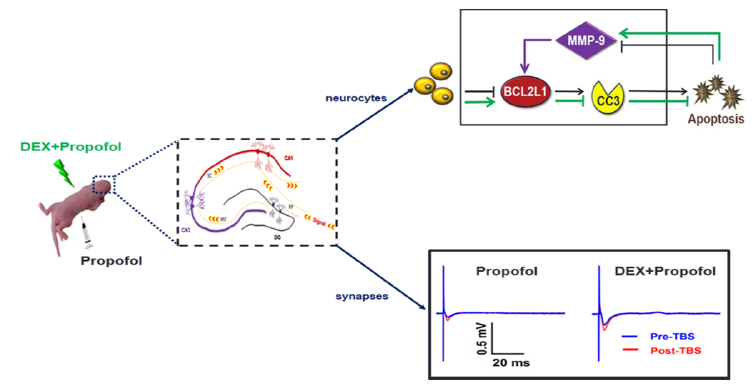Articles
Article Tools
Stats or Metrics
Article
Original Article
Exp Neurobiol 2020; 29(5): 356-375
Published online October 31, 2020
https://doi.org/10.5607/en20032
© The Korean Society for Brain and Neural Sciences
Neuroprotection of the Developing Brain by Dexmedetomidine Is Mediated by Attenuating Single Propofol-induced Hippocampal Apoptosis and Synaptic Plasticity Deficits
Wenchong Sun, Jian Wang, Dasheng Cai and Ling Pei*
Department of Anesthesiology, the First Affiliated Hospital, China Medical University, Shenyang 110001, China
Correspondence to: *To whom correspondence should be addressed.
TEL: 86-024-83282910, FAX: 86-024-83282910
e-mail: lingpei49@vip.sina.com
This is an Open Access article distributed under the terms of the Creative Commons Attribution Non-Commercial License (http://creativecommons.org/licenses/by-nc/4.0) which permits unrestricted non-commercial use, distribution, and reproduction in any medium, provided the original work is properly cited.
Abstract
Dexmedetomidine (DEX) has neuroprotective effects and its efficacy was determined in propofol-treated pups. Postnatal day (P) 7 rats were exposed to propofol and DEX to investigate the induced apoptosis-related gene expression. Furthermore, synaptic structural changes at the cellular level were observed by electron microscopy. Induction of hippocampal long-term potentiation (LTP) of P30 rats and long-lasting performance of spatial discrimination at P30 and P60 were evaluated. After a single propofol exposure to P7 rats, DEX pretreatment effectively rescued the profound apoptosis seen in hippocampal neurocytes, and strongly reversed the aberrant expression levels of Bcl2-like 1 (BCL2L1), matrix metallopeptidase 9 (MMP-9) and cleaved caspase 3 (CC3), and sharply enhanced synaptic plasticity. However, there were no significant differences in escape latency or crossing times in a probe test. This was accompanied by no obvious reduction in search strategies among the rat groups. No impairment of long-term learning and memory in P30 or P60 rats was detected when using a single dose propofol treatment during the most vulnerable period of brain development. DEX was shown to ameliorate the rodent developmental neurotoxicity caused by a single neonatal propofol challenge, by altering MMP-9, BCL2L1 and CC3 apoptotic signaling.
Graphical Abstract

Keywords: Apoptosis, Dexmedetomidine, Propofol, Synaptic plasticity


